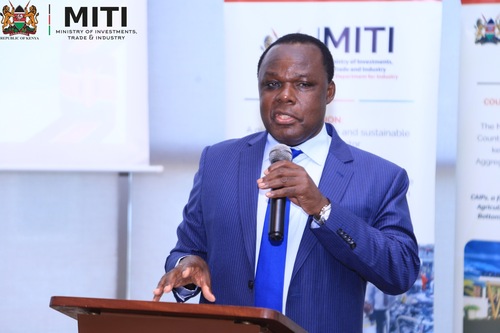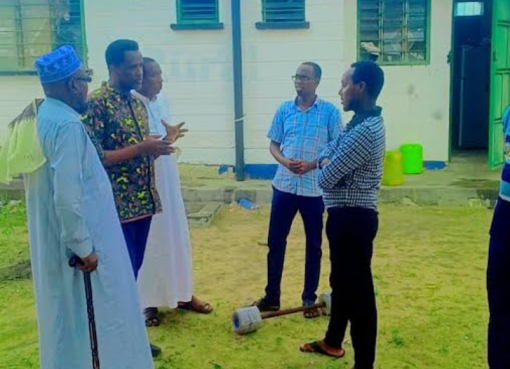Construction of County Aggregation and Industrial Parks (CAIPs) has kicked-off in earnest, as the government moves to stimulate manufacturing across the country.
The project, a partnership between the State Department for Industry and the Council of Governors (COG), will see each county allocate Sh. 250 million towards the initiative this Financial Year, which shall be matched with a similar amount from the National Government.
State Department for Industry Principal Secretary (PS), Dr. Juma Mukhwana, said so far 25 county governments have identified land and advertised tenders for the construction of the parks.
“We have already launched construction in Busia. Next week we are launching Homa Bay and Siaya,” he said.
Counties targeted in the First Phase are Bomet, Elgeyo Marakwet, Isiolo, Kajiado, Kericho, Kilifi, Baringo, Kisumu, Wajir, Samburu, Nyeri, Nyandarua and Kisii.
Others are Kitui, Laikipia, Lamu, Machakos, Mandera, Narok, Nyandarua, Taita Taveta, Tharaka Nithi, Trans Nzoia, Vihiga, and Wajir.
The PS said the National Government has partnered with the AFRIEXIM Bank and the Africa Development Bank (ADB), which have availed funds for the purchase of equipment to be installed at the facilities.
In an interview with KNA in Kisumu, the PS said the government was sourcing for players in the private sector, to take-up the running of the facilities once completed.
He added that a feasibility study for the project has been finalized and value chains for each county identified.
“We have identified specific value chains for each county. For example, here in Kisumu we are going to focus on fish processing, cotton and rice,” he said.
This, he said was in line with the National Government’s Bottom-Up Transformational Economic Agenda (BETA) economic model, which targets to stimulate growth at the grassroots.
The CAIPs, he said, will act as common manufacturing facilities to support startups and Small and Medium Enterprises (SME’S), to commercialize and expand their ventures.
“If a small firm is doing rice for example, they will go to the facility, have the rice processed, milled and packed at a fee then proceed to sell it,” he said.
“This is the model we are promoting to scale-up manufacturing in the country. You don’t have to worry about water, electricity or packaging. All you need is to bring your product and we do all that for you at a reasonable fee,” he added.
According to the tender documents, each CAIP will have a minimum of four manufacturing sheds of 4,000 square metres, thus devolving manufacturing capacity, to each of the 47 counties.
They are to be located within the proximity to production areas, to serve farmers and primary producers through collection, storage and sorting and even primary processing and value addition.
There will also be an aggregation centre of 4,000 square metres, which will have a cold storage facility to prevent post-harvest losses.
Dr. Mukhwana said the government through partnership with the Kenya Private Sector Alliance (KEPSA), will place students on internship at the facilities, to aid in the day-to-day operations.
The students shall be paid a monthly stipend to sustain them, as they polish their skills.
Technical Vocational Education Training (TVET), he said, has been identified as a key driver of the sector, adding that the government was benchmarking with Canada, to take the sector to the next level.
The TVET sector, he added, has received funding in this year’s budget to employ 3, 000 trainers, to drive the transformation agenda.
“This is geared towards ensuring that we have the right skills to build an induatrialised country,” he said.
By Chris Mahandara




